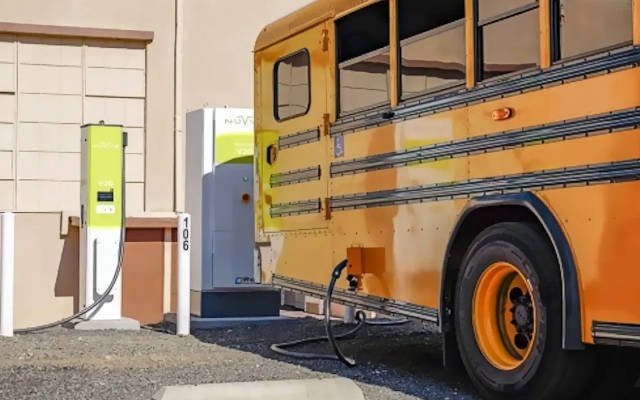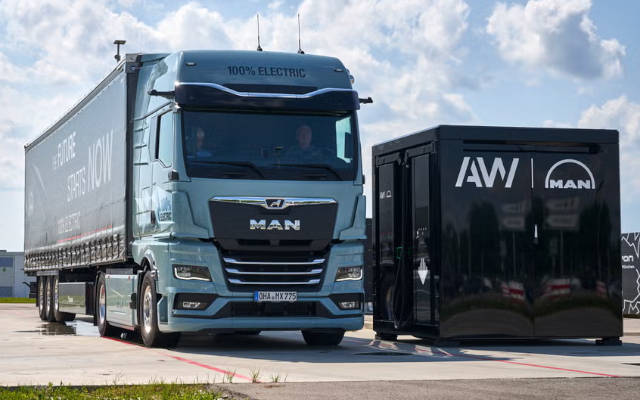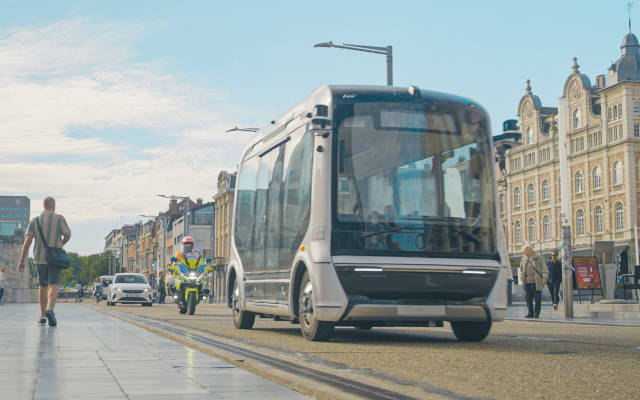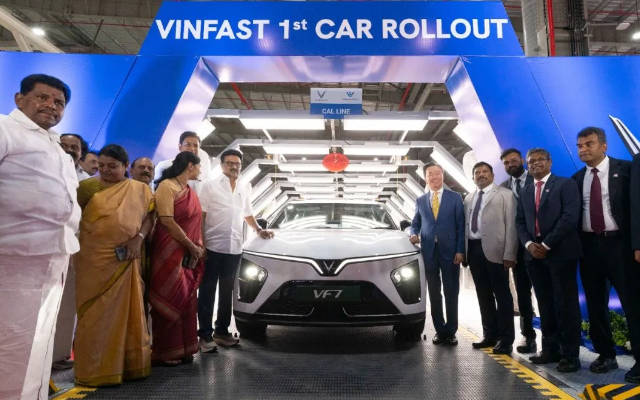 EDITOR'S PICK
EDITOR'S PICK
ComEd Begins Testing Phase of First of Its Kind Vehicle-to-Grid Charging Pilot with Local School Districts
14 Sep 2025 | Synopsis
 ComEd launched testing for its first vehicle-to-grid (V2G) charging pilot with three Illinois school districts. The initiative uses bidirectional chargers on electric school buses to explore energy optimization, grid support, and cost savings during peak demand. Part of ComEd's Beneficial Electrification Plan, the pilot aims to scale V2G tech and includes partners like Nuvve and Resource Innovations.
ComEd launched testing for its first vehicle-to-grid (V2G) charging pilot with three Illinois school districts. The initiative uses bidirectional chargers on electric school buses to explore energy optimization, grid support, and cost savings during peak demand. Part of ComEd's Beneficial Electrification Plan, the pilot aims to scale V2G tech and includes partners like Nuvve and Resource Innovations.The Illusion of Clean: How Big Oil Perfected the Art of Greenwashing
13 Sep 2025 | Synopsis
 Big Oil's decades-long greenwashing campaign used PR to mask environmental harm. Chevron's "People Do" ads, Exxon's climate denial lobbying, and BP's carbon footprint push shifted blame to consumers. Investors like BlackRock and execs like Rex Tillerson profited, while conservative politicians traded support for donations. Lawsuits from cities and youth groups now challenge fossil fuel deception, aiming to hold companies accountable in court.
Big Oil's decades-long greenwashing campaign used PR to mask environmental harm. Chevron's "People Do" ads, Exxon's climate denial lobbying, and BP's carbon footprint push shifted blame to consumers. Investors like BlackRock and execs like Rex Tillerson profited, while conservative politicians traded support for donations. Lawsuits from cities and youth groups now challenge fossil fuel deception, aiming to hold companies accountable in court.This Giant Black Box is the EV Charger of the Future
13 Sep 2025 | Synopsis
 A massive black box spotted in California is the Smart Charging Cube, a mobile EV fast charger built by AW Automotive and MAN Truck & Bus. Designed for electric big rigs, it delivers up to 400 kW from its onboard battery and up to 1,000 kW when connected to a Megawatt Charging System. It’s built for job sites and fleet use, offering high-speed charging without permanent grid infrastructure.
A massive black box spotted in California is the Smart Charging Cube, a mobile EV fast charger built by AW Automotive and MAN Truck & Bus. Designed for electric big rigs, it delivers up to 400 kW from its onboard battery and up to 1,000 kW when connected to a Megawatt Charging System. It’s built for job sites and fleet use, offering high-speed charging without permanent grid infrastructure.WeRide Enters Belgium as Autonomous Robobus Rolls Into Leuven
11 Sep 2025 | Synopsis
 WeRide launched its autonomous Robobus in Leuven, Belgium, marking its 11th global market. In partnership with De Lijn and Espaces-Mobilités, the pilot will run through January 2026, aiming to improve first- and last-mile transit. Mapping begins now, with public testing mid-September. The project reflects Belgium’s push for smart mobility and AV integration.
WeRide launched its autonomous Robobus in Leuven, Belgium, marking its 11th global market. In partnership with De Lijn and Espaces-Mobilités, the pilot will run through January 2026, aiming to improve first- and last-mile transit. Mapping begins now, with public testing mid-September. The project reflects Belgium’s push for smart mobility and AV integration.What's Keeping The Indian Middle Class From Driving An Electric Car?
11 Sep 2025 | Synopsis
 India’s middle class is hesitant to adopt EVs due to high import prices, limited public charging, and range anxiety. Tesla’s Model Y costs ₹6M ($68K), far above mainstream affordability. Local production is key—Vietnam’s VinFast and India’s Tata Motors offer EVs closer to ₹1–2.3M. With EVs at just 5.3% market share, scaling infrastructure and lowering costs are critical for broader adoption.
India’s middle class is hesitant to adopt EVs due to high import prices, limited public charging, and range anxiety. Tesla’s Model Y costs ₹6M ($68K), far above mainstream affordability. Local production is key—Vietnam’s VinFast and India’s Tata Motors offer EVs closer to ₹1–2.3M. With EVs at just 5.3% market share, scaling infrastructure and lowering costs are critical for broader adoption.
 Si Exclusive
Si Exclusive
Hydrogen's Flight Path: Fuel Cells, Turbines, and the Economics of Clean Aviation
10 Oct 2025 |  Aviation is shifting from Jet A to four fuel systems: electricity, hydrogen (fuel cell and combustion), SAF, and petroleum. Fuel cells suit short-haul aircraft; hydrogen combustion may power long-range jets. SAF bridges legacy fleets. Hydrogen costs - $5-$7/kg today, possibly $2/kg by 2040 - impact ticket prices and infrastructure decisions. Airport authorities, airlines, and governments will share deployment costs. Each fuel has distinct environmental pros and cons shaping aviation's net-zero future.
Aviation is shifting from Jet A to four fuel systems: electricity, hydrogen (fuel cell and combustion), SAF, and petroleum. Fuel cells suit short-haul aircraft; hydrogen combustion may power long-range jets. SAF bridges legacy fleets. Hydrogen costs - $5-$7/kg today, possibly $2/kg by 2040 - impact ticket prices and infrastructure decisions. Airport authorities, airlines, and governments will share deployment costs. Each fuel has distinct environmental pros and cons shaping aviation's net-zero future.
 11 Oct 2025 13:19:45 UTC |
RECENT PODCASTS
BYD Soars - Cheaper Tesla Models - The Bolt is Back - Rivian
SEARCH RSSTREAM
 30 New Postings In Past 24 Hours
30 New Postings In Past 24 Hours
Category:mobility
Region:Europe
Date:10 Oct 2025
Category:energy
Region:Global
Date:10 Oct 2025
Category:mobility
Region:SoAmerica
Date:10 Oct 2025
Category:energy
Region:NoAmerica
Date:10 Oct 2025
Category:mobility
Region:NoAmerica
Date:10 Oct 2025
Category:finance
Region:AsiaPacific
Date:10 Oct 2025
Category:policy
Region:NoAmerica
Date:10 Oct 2025
Category:finance
Region:NoAmerica
Date:10 Oct 2025
Category:mobility
Region:AsiaPacific
Date:10 Oct 2025
Category:policy
Region:NoAmerica
Date:10 Oct 2025